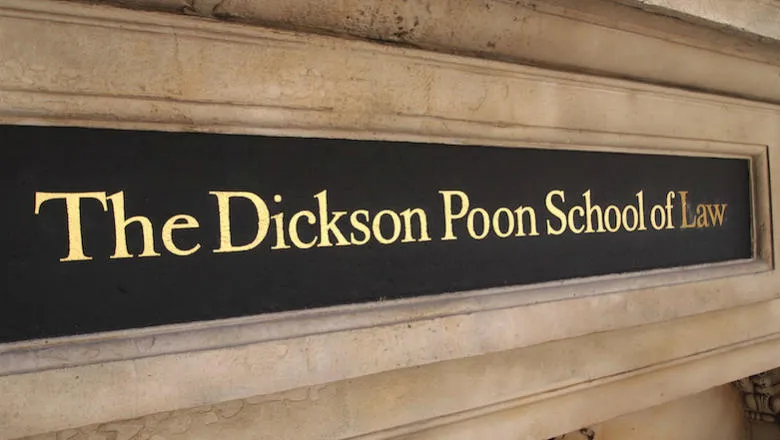A Book Launch with Dr. Christoph Kletzer 'The Idea of a Pure Theory of Law'
The Yeoh Tiong Lay Centre for Politics, Philosophy and Law presents a book launch with Dr. Christoph Kletzer's new book 'The...
19 March 2012
King’s College London is embarking on a £40million programme of investment in the School of Law.

This ambitious initiative has been made possible by a personal gift of £20 million from Mr Dickson Poon CBE, a well-known Hong Kong-based philanthropist. His remarkably generous gift is the largest donation from an individual in the College’s history, and the largest ever to a British or European law faculty.
The School will be renamed The Dickson Poon School of Law in recognition of Mr Poon. The School of Law at King’s has enjoyed a tradition of excellence for over 175 years and is already recognized as one of the world’s top 25 law schools (QS 2011 rankings). The School has recently moved into Somerset House East Wing, an iconic building in central London, located at the centre of the British legal and political world and surrounded by major City law firms.
The £40 million investment strategy will establish the School of Law as a leader in the field of transnational law – thinking beyond particular national jurisdictions and seeking global solutions to the world’s legal challenges – in order to pioneer a new standard of legal education for the 21st century and translate research findings that guide legal reform, policy development and commercial practice. With its new home in Somerset House East Wing, The Dickson Poon School of Law will become a dynamic international centre for legal research, bridging the worlds of higher education, policy and business.
The donation will also be used to drive a worldwide recruitment campaign for eight new Distinguished Chair positions and a further seven ‘rising stars’, in order to establish the School as an unrivalled centre for legal research. Up to 75 students a year will benefit from an Ivy League-style scholarship programme, of which 15 places will be reserved for students currently resident in Hong Kong and mainland China.
The Rt Hon Sir John Major KG CH, former British Prime Minister and Chairman of the College’s World questions | King’s answers fundraising campaign, attended a celebration in Hong Kong on Sunday evening (18th March), hosted by Mr Poon.
Sir John said: ‘I am enormously grateful to Dickson Poon for honouring King’s and the School of Law with this exceptional gift. The new Dickson Poon School of Law will attract the best and brightest legal scholars and students from around the world, and the academic faculty will pioneer a new standard for others to follow.’ Dickson Poon is Group Executive Chairman of The Dickson Group of Companies and well-known for his philanthropic support of education and health care. Commenting on his gift, he said: ‘My donation reflects a shared enthusiasm with the distinguished Law Faculty at King’s College London to set new standards in legal education and research.
The faculty will be expanded, student scholarships increased, leadership forums created and a new degree introduced. These ground-breaking innovations underscore our unique focus on transnational law that will groom future leaders needed to guide an increasingly connected world.’
Professor Sir Richard Trainor, Principal and President of King’s College London, commented: ‘This £40 million project has only been made possible thanks to the extraordinary vision of Dickson Poon and his exceptionally generous offer to partner with us. The creation of The Dickson Poon School of Law is a milestone achievement in the 180-year history of King’s College London and will open a new era of academic opportunity. It is wonderful that we can celebrate the creation of The Dickson Poon School of Law so soon after providing the School with a fitting home in the stunning setting of Somerset House East Wing.’ The Dickson Poon School of Law will set the standards for the next generation of legal research and education by moving to a truly transnational approach.
This field has become increasingly important with the globalization of business and legal practice, and includes research into transnational institutions such as the European Union and APEC (Asia-Pacific Economic Cooperation).
The Yeoh Tiong Lay Centre for Politics, Philosophy and Law presents a book launch with Dr. Christoph Kletzer's new book 'The...